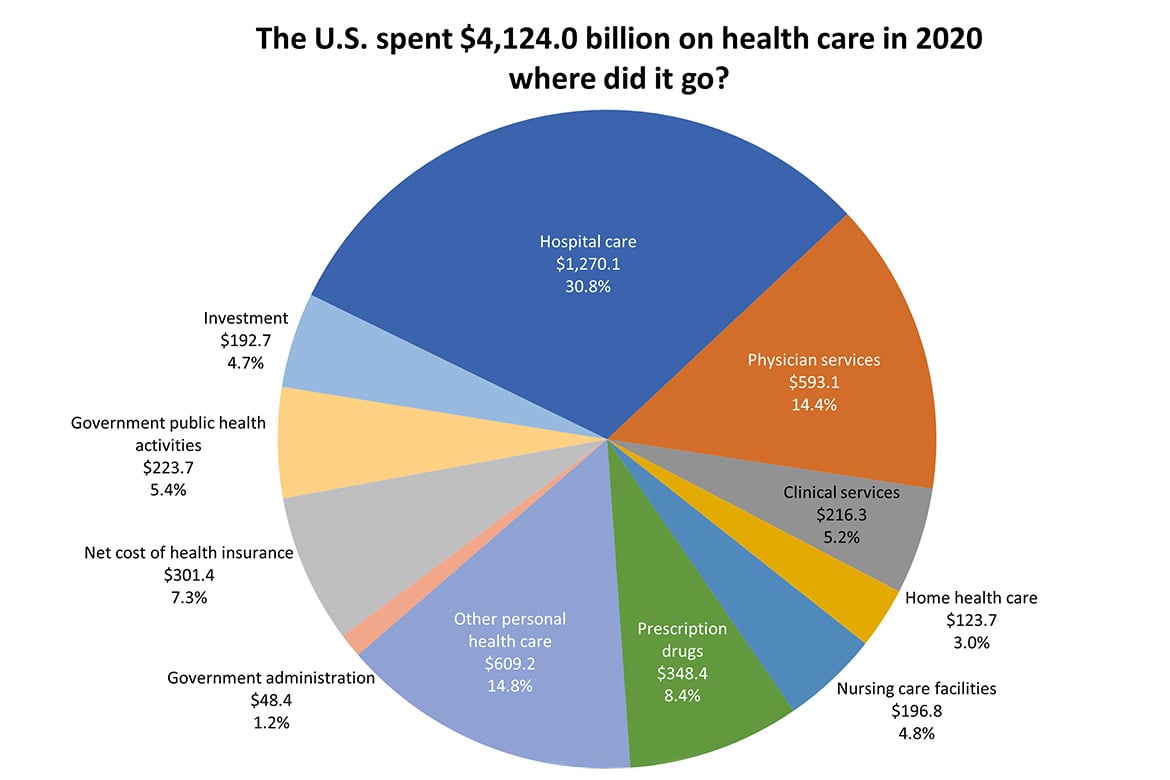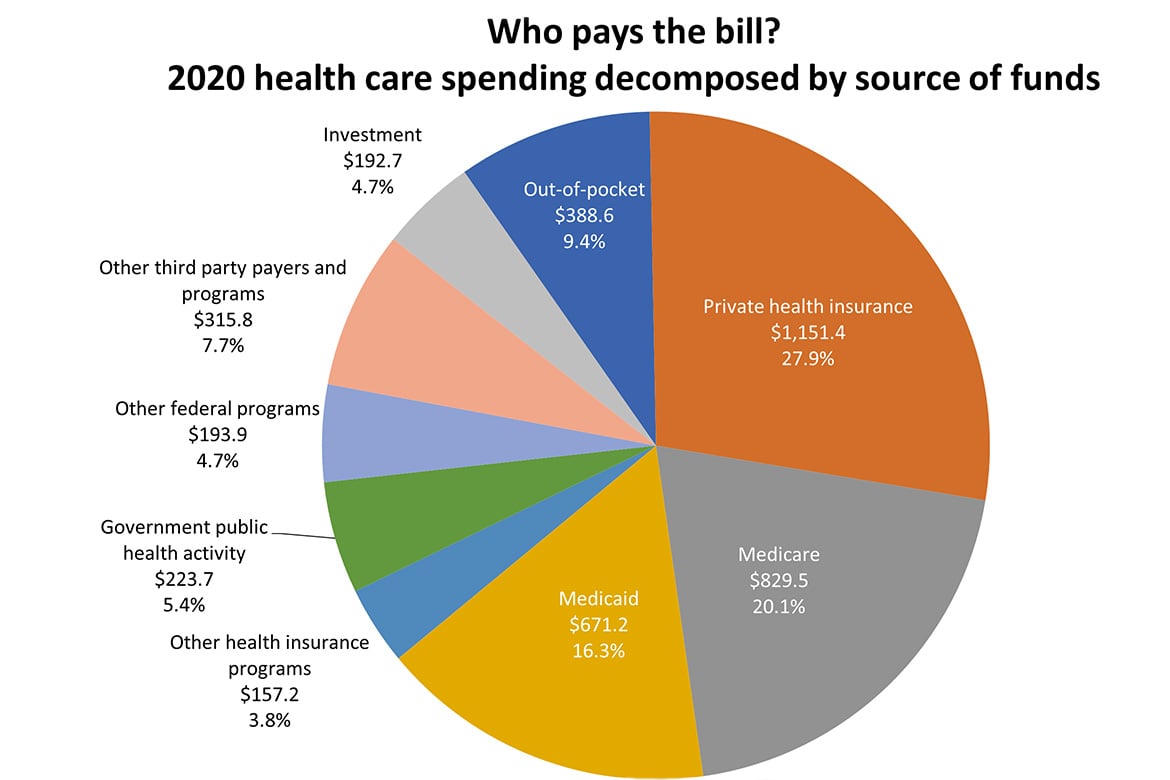
There are very few things in life that bestow a benefit on everyone of any age who utilizes them. One of the biggest, and probably the most misunderstood is the Health Savings Account, commonly known as an HSA. (And, under the right circumstances, young workers benefit the most.)
fjfjfgjgjgjgjgjghjgh
According to the American Medical Association
The United States spent $4,124.0 billion on health care in 2020.
Where Does the Money Go?

This spending can be broken down into the following categories:
- Hospital care
- Physician services
- Clinical services
- Prescription drugs
- Nursing care facilities
- Home health care
- Other personal health care costs
- Government administration: includes all administrative costs associated with insuring individuals in health insurance programs
- Net cost of health insurance: The difference between what insurers incur in premiums and the amount paid in benefits. This includes administrative costs, additions to reserves, rate credits and dividends, premium taxes and fees, and net underwriting gains or losses
- Government public health activities
- Investment spending
djdhfhfhfhfhfhf
Although physician services was the second largest category of health spending, over the last 10 years, spending on physician services has grown more slowly than spending in the other large categories of personal health care. Physician spending grew by an average of 3.9% per year between 2009 and 2019 while hospital services (4.5%) and clinical services (6.5%) had higher growth rates.
In 2020, spending on physician services grew 5.3%, a substantially higher growth rate compared to previous years. This acceleration was driven by spending on federal relief programs (classified as “other federal programs” in the following chart). When removing this component from the estimates, spending on physician services decreased by 1.0%. This modified estimate better reflects the substantial drop in utilization of medical goods and services in 2020.
jjhfhfhfhfhfhfh
Who Pays the Bill?

The $4.1 billion in spending can also be broken down by “who pays the bill”?
- Private health insurance
- Out-of-pocket
- Medicare
- Medicaid
- Other health insurance programs
- Government public health activities: spending by federal, state and local governments to prevent or control public health concerns and to organize and deliver publicly provided health services
- Other federal programs include pandemic-related funding
- Other third-party payers and programs
- Investment spending
fjfjfjjhfhjfhfh
Although government public health activities and other federal programs make up a comparatively small share of health spending, spending in these categories increased substantially in 2020 by 113.1% and 1282.0%, respectively. Government public health activities involved spending on vaccination services as well as epidemiological surveillance, disease prevention programs, and the operation of public health laboratories (Centers for Medicare and Medicaid Services, 2021*).
fjffhfhhfhfhf
Average cost of health insurance
According to Lendingtree:
In 2023, the average cost of individual health insurance for a 40-year-old on a silver plan is projected to be $560 per month — a 4% increase from the 2022 plan year.
One of the primary factors in individual health insurance costs is location, as prices will vary depending on the state and county in which you live. In this table, we look at health insurance premiums for 2023 and how they differ by state.
| State | Monthly cost | Annual cost | % change from average | |
|---|---|---|---|---|
| National | $560 | $6,721 | – | |
| 1 | Wyoming | $882 | $10,584 | 57.47% |
| 2 | West Virginia | $871 | $10,452 | 55.50% |
| 3 | Alaska | $822 | $9,864 | 46.75% |
| 4 | South Dakota | $792 | $9,504 | 41.40% |
| 5 | New York | $776 | $9,312 | 38.54% |
| 6 | Vermont | $760 | $9,120 | 35.69% |
| 7 | North Carolina | $666 | $7,992 | 18.90% |
| 8 | Louisiana | $652 | $7,824 | 16.40% |
| 8 | Nebraska | $652 | $7,824 | 16.40% |
| 10 | Oklahoma | $634 | $7,608 | 13.19% |
| 11 | Missouri | $626 | $7,512 | 11.76% |
| 12 | Connecticut | $614 | $7,368 | 9.62% |
| 13 | Florida | $599 | $7,188 | 6.94% |
| 14 | Alabama | $591 | $7,092 | 5.51% |
| 15 | Texas | $589 | $7,068 | 5.16% |
| 16 | Nevada | $575 | $6,900 | 2.66% |
| 17 | Arizona | $569 | $6,828 | 1.59% |
| 18 | Delaware | $566 | $6,792 | 1.05% |
| 19 | Kansas | $565 | $6,780 | 0.87% |
| 20 | Illinois | $561 | $6,732 | 0.16% |
| 21 | Utah | $558 | $6,696 | -0.38% |
| 22 | Massachusetts | $553 | $6,636 | -1.27% |
| 23 | Iowa | $551 | $6,612 | -1.63% |
| 23 | New Mexico | $551 | $6,612 | -1.63% |
| 25 | Wisconsin | $550 | $6,600 | -1.81% |
| 26 | California | $541 | $6,492 | -3.41% |
| 27 | North Dakota | $538 | $6,456 | -3.95% |
| 28 | New Jersey | $535 | $6,420 | -4.48% |
| 29 | Tennessee | $533 | $6,396 | -4.84% |
| 30 | Pennsylvania | $532 | $6,384 | -5.02% |
| 31 | Montana | $519 | $6,228 | -7.34% |
| 32 | Ohio | $513 | $6,156 | -8.41% |
| 33 | Maine | $506 | $6,072 | -9.66% |
| 34 | Mississippi | $499 | $5,988 | -10.91% |
| 35 | Oregon | $493 | $5,916 | -11.98% |
| 36 | Colorado | $489 | $5,868 | -12.70% |
| 37 | Idaho | $483 | $5,796 | -13.77% |
| 38 | Hawaii | $482 | $5,784 | -13.95% |
| 39 | Kentucky | $479 | $5,748 | -14.48% |
| 40 | Georgia | $474 | $5,688 | -15.38% |
| 41 | Washington | $470 | $5,640 | -16.09% |
| 42 | South Carolina | $469 | $5,628 | -16.27% |
| 43 | Arkansas | $456 | $5,472 | -18.59% |
| 44 | Michigan | $435 | $5,220 | -22.34% |
| 45 | Indiana | $425 | $5,100 | -24.12% |
| 45 | Virginia | $425 | $5,100 | -24.12% |
| 47 | Rhode Island | $424 | $5,088 | -24.30% |
| 48 | Minnesota | $404 | $4,848 | -27.87% |
| 49 | Maryland | $385 | $4,620 | -31.26% |
| 50 | New Hampshire | $372 | $4,464 | -33.59% |
As noted above, the average annual healthcare cost per person in 2023 is projected to be $6721.00. There are multiple ways to mediate the rising costs of healthcare. Starting an HSA (Health Savings Account) could potentially be one of the best solutions.
hghhghghghhghg
What are HSAs?
According to healthcare.gov: A HSA is a type of savings account that lets you set aside money on a pre-tax basis to pay for qualified medical expenses. (By using untaxed dollars in a Health Savings Account (HSA) to pay for deductibles, copayments, coinsurance, and some other expenses, you may be able to lower your overall healthcare costs. HSA funds generally may not be used to pay premiums.)
ifuufyfyfyfyf
Why are HSAs beneficial for everyone?
HSAs provide potential tax benefits for all participants, along with a chance to participate in a high-deductible health insurance plan. It provides a framework that allows all participants to make tax-deductible contributions to either a family or individual HSA. The dollars deposited into an HSA account can then be used to pay annual deductible expenses incurred in the high deductible health insurance plan or, if paying for deductible expenses out of pocket, the deposits can be saved and invested to pay future medical expenses.
Probably the biggest benefit of the HSA is that it is triple tax-advantaged. This means that all contributions are tax-deductible, qualified medical expenses can be paid for using tax-free HSA dollars, and earnings within the HSA grow tax-deferred and can be used tax-free to pay for qualifying medical expenses. (This is not to be confused with some Municipal Bonds that are triple tax-free, meaning these bonds are not subject to municipal, state, or federal taxation.) Another less publicized benefit is that contributions made to an HSA on a pre-tax basis avoid Social Security and Medicare taxes, often known as FICA taxes (Federal Insurance Contributions Act).
jfhfhfhhfhhhfh
Who can qualify for an HSA account?
According to irs.gov:
To be an eligible individual and qualify for an HSA contribution, you must meet the following requirements.
- You are covered under a high deductible health plan (HDHP), described later, on the first day of the month.
- You have no other health coverage except what is permitted under Other health coverage, later.
- You aren’t enrolled in Medicare.
- You can’t be claimed as a dependent on someone else’s tax return.
- Not in receipt of VA or Indian Health Service (IHS) medical benefits within the last three months.
- Not covered by your own or your spouse’s flexible spending account (FSA), and are not claimed as a dependent on someone else’s tax return
hjfjhfjjfjjhgfjg
What is an HDHP?
A High deductible health plan (HDHP) is a plan with a higher deductible than a traditional insurance plan. The monthly premium is usually lower, but you pay more health care costs yourself before the insurance company starts to pay its share (your deductible). A high deductible plan (HDHP) can be combined with a health savings account (HSA), allowing you to pay for certain medical expenses with money free from federal taxes. For 2023, an HDHP is any plan with a deductible of at least $1,500 for an individual or $3,000 for a family. The maximum out-of-pocket expenses are $7,500 for an individual and $15,000 for a family. The deductible is the amount you’ll pay out of pocket for medical expenses before your insurance pays anything. In addition, the plan’s out-of-pocket maximum must be no higher than $7,500 for an individual plan or $15,000 for a family plan. The out-of-pocket maximum is the most you’ll have to pay in a year for medical expenses covered by your insurance plan.
An HDHP has:
- A higher annual deductible than typical health plans, and
- A maximum limit on the sum of the annual deductible and out-of-pocket medical expenses that you must pay for covered expenses. Out-of-pocket expenses include copayments and other amounts but don’t include premiums.
kgfjgjjgjhgjjhg
How do HSAs function?
- Establish a high-deductible health plan. For most workers, this will depend on the availability of high-deductible health plans through the current employer. Because of employer-established health plans, this type of health plan may not be available to all workers. For self-employed individuals, it is much easier as self-employed can establish any type of acceptable health plan.
- Set up an HSA. In many cases, an HSA may come with your HDHP. If one is not provided, you can set up the account on your own. Banks, credit unions, and brokerages all offer HSAs. Each HSA provider can create its own terms. (Many HSAs now allow you to invest your contributions in stocks, bonds, or funds.)
- Fund the HSA. The HSA contribution limit for 2023 is $3,850 for self-only coverage and $7,750 for family coverage. Those 55 and older can contribute an additional $1,000 as a catch-up contribution.
- Use contributions to pay for qualified out-of-pocket medical expenses (or pay out-of-pocket expenses directly and use the HSA as a tax-sheltered savings account.)
jtjgjjgjgjg
This is where it gets interesting. For the tax year 2022, you can make contributions up until April 18, 2023. The dollars contributed can be used to pay qualified medical expenses. Money used for qualifying medical expenses Is not taxed. Money not used in any given year is rolled over into the account and can be saved, or used for future medical expenses. If someone chooses to pay for all medical deductibles and expenses out of pocket, then all contributed funds can be invested and allowed to grow tax-deferred. In this manner, the HSA becomes a triple tax advantage savings plan. Qualifying medical statements can be saved for reimbursement at some future date. For HSA accounts there is currently no expiration for the reimbursement of qualifying medical expenses paid out of pocket. For this strategy to have the maximum effect the policyholder must be able to pay medical expenses out of pocket and should be in good health to minimize healthcare expenses. This would tilt maximum effectiveness towards younger policyholders who are generally healthier and have a longer time horizon to maximize account growth.
fhfhgfhjghghghg
Final Thoughts
- HSAs provide benefits for all age groups.
- HSAs are triple tax-advantaged when used to pay qualified health expenses.
- At age 65, you can take penalty-free distributions from the HSA for any reason. However, in order to be both tax-free and penalty-free the distribution must be for a qualified medical expense. Withdrawals made for other purposes will be subject to ordinary income taxes.
- HSAs provide the opportunity for multiple strategies for tax-free contributions, tax-deferred growth, and tax-free distributions.
- Younger participants will benefit most from HSA accounts (especially if in good health and able to pay some or all of their medical bills out-of-pocket, allowing HSA funds to grow tax-free.)
gdgdgdgdgdgdgdgdgd
If you’d like to be a part of a free online retirement community, join us on Facebook:
COMMENTS